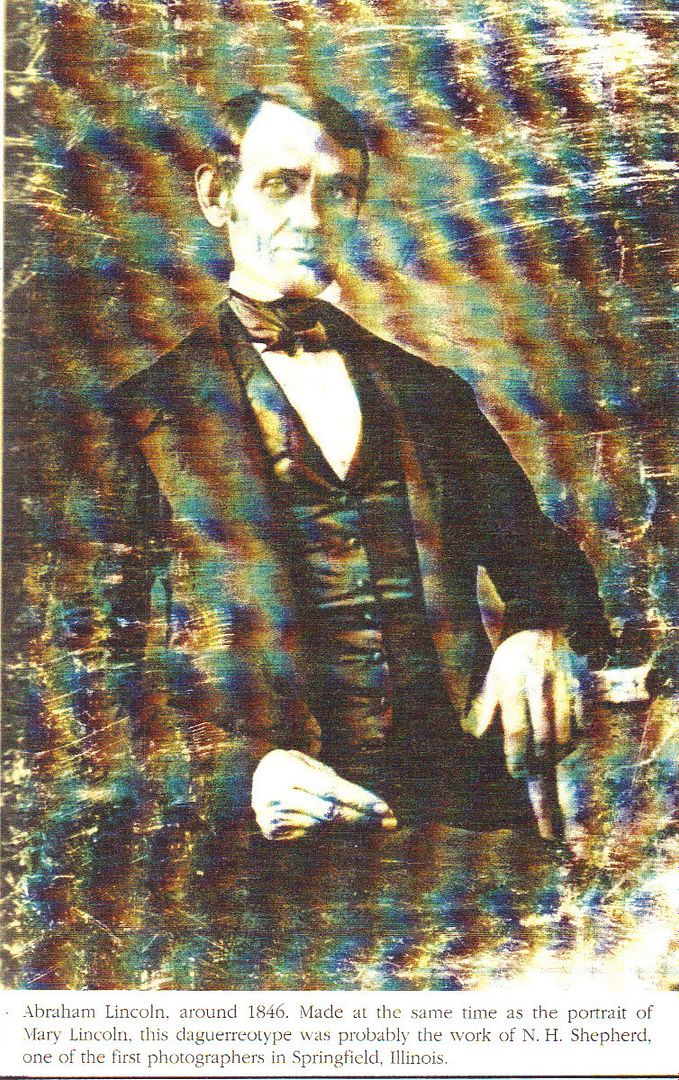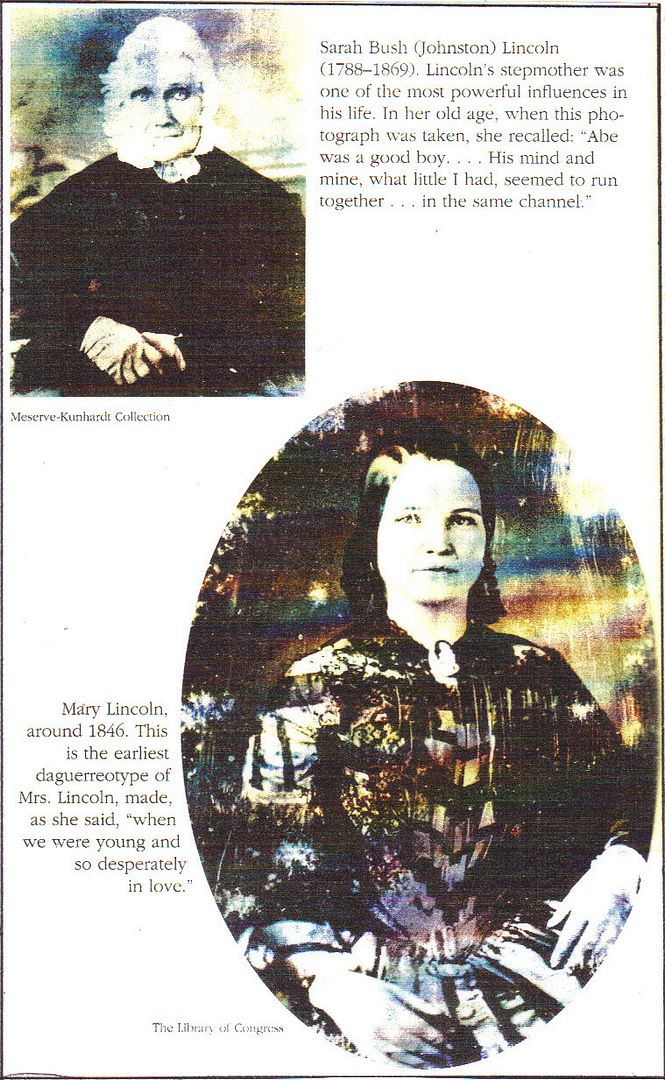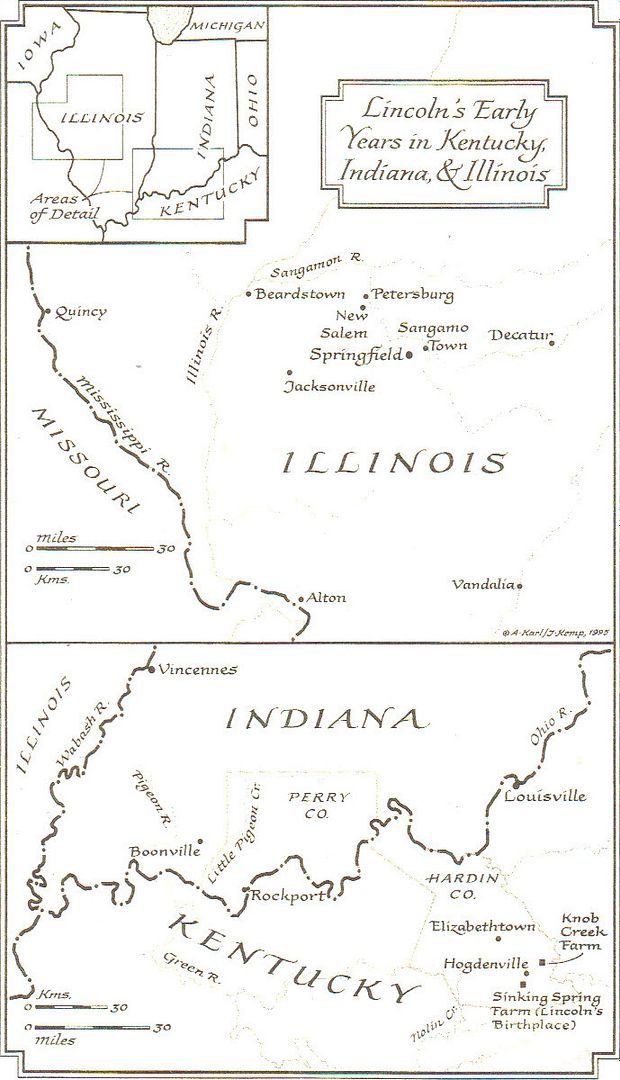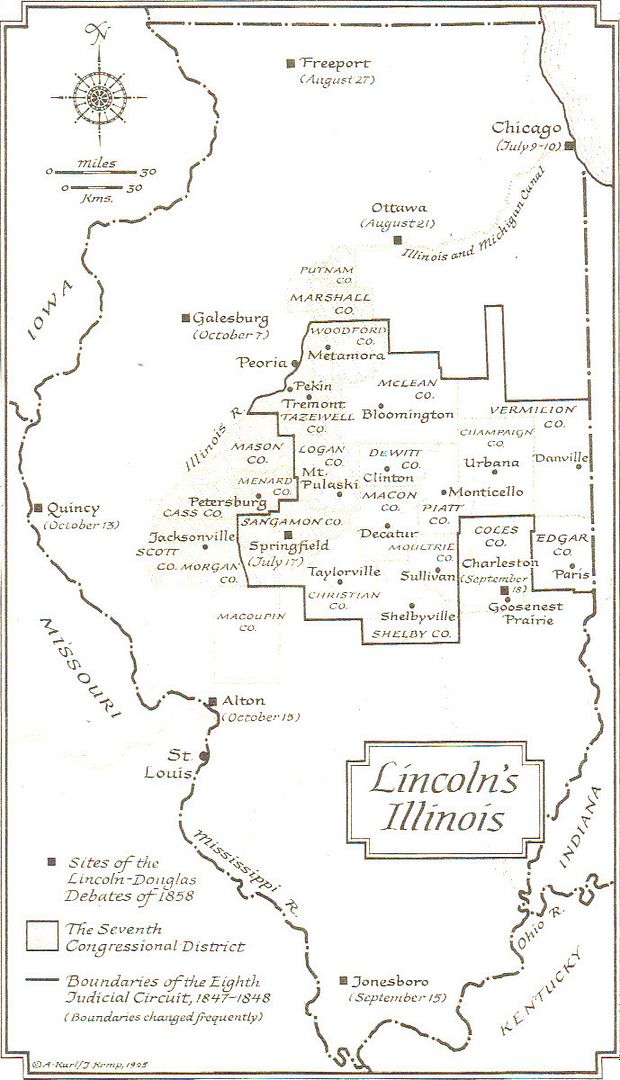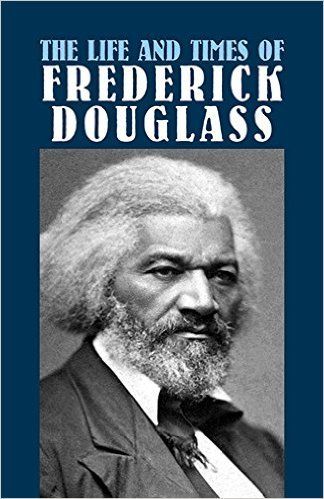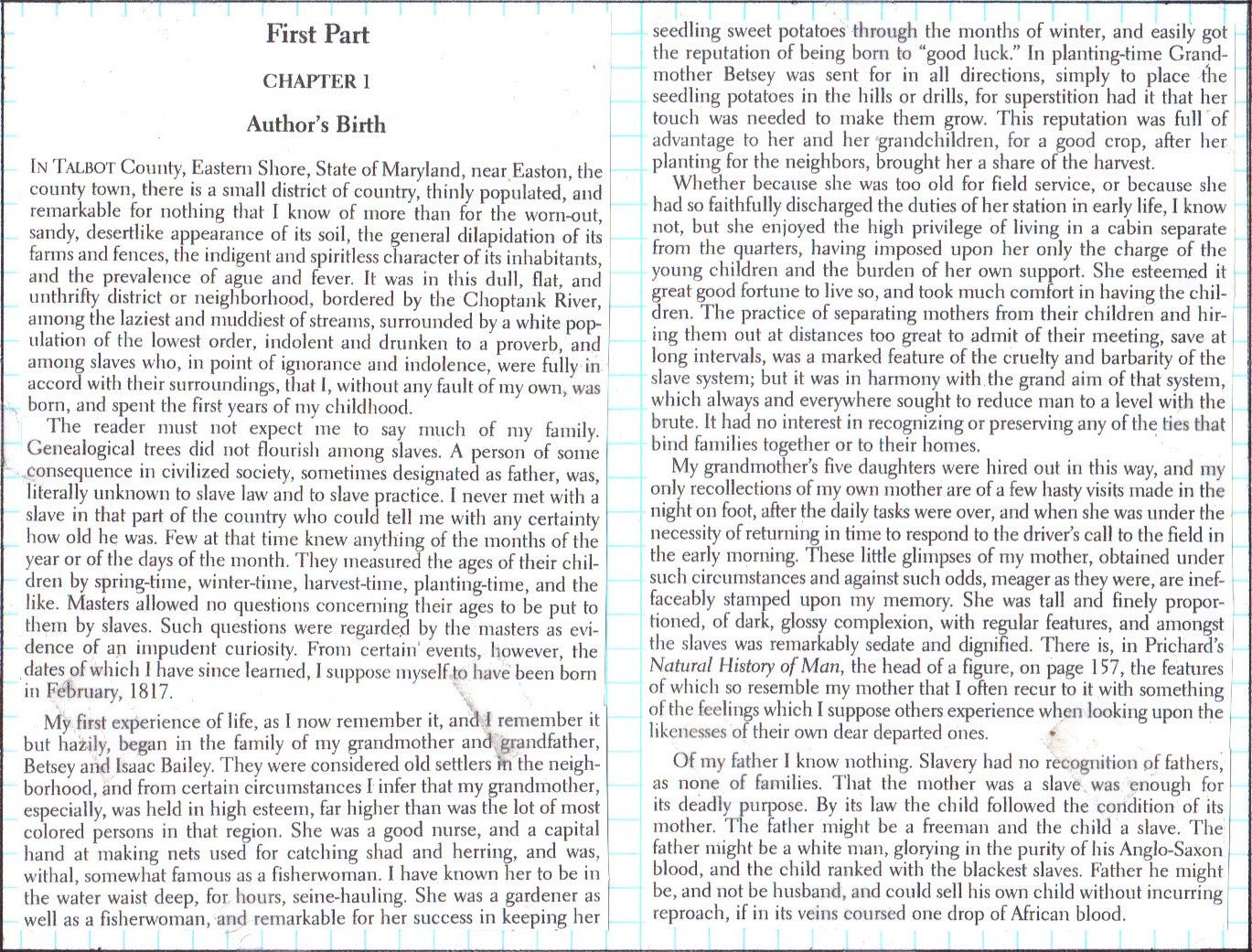150 years ago today the Civil War had been over for several months. 160 years ago today the Civil War was still over five years off. I have decided to use the latter date to begin this series rather than something like 155 years for a couple reasons. I like the tidiness of the even 10 years and this gives me an opportunity to learn a little about the era. My knowledge of pre-Civil War history as well as that of the war itself is even more deficient than my knowledge of World War II history was before I started my previous project. This way I can take a much more in-depth look at the period before the shooting starts. One of my regrets about the WWII project was that I was so busy putting the threads together ahead of the calendar that I didn’t have time to read most of the material I was posting, let alone additional background material. For example, I have 2 books on the battle of Midway that I still haven’t read.
As you can tell by the title of this thread I don’t plan on posting very much, at least for a good long while. As mentioned previously, Harpers Weekly is available on line from 1858 on. I have downloaded the first year for posting beginning 2018. Since there will be long periods between 160-year-old news posts I thought we could fill the time by comparing notes on books about the period and discussing the history that led up to the “Bleeding Kansas†affair. I will attempt to lay out the basic facts now.
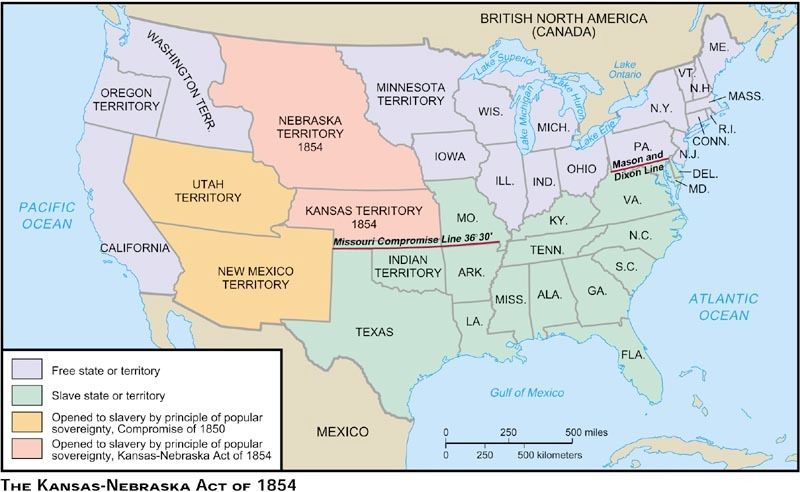
A real look at the history of slavery in the United States would go back to the 17th century at least and could go as far back as the age of the Torah, but I will start with the Compromise of 1820 (Missouri Compromise). https://en.wikipedia.org/wiki/Missouri_Compromise That was devised by Henry Clay, an icon of the Whig party (of which A. Lincoln was a member). The compromise was intended as a solution to disputes of whether newly organized territories and states of the U.S. would allow slavery or not. It set a dividing line at 36° 30’ north latitude. Slavery would be prohibited in territory north of the line and allowed south of it. The exception was Missouri, which was north of the line but was admitted as a slave state.
By 1854 members of Congress were eager to start settling the vast farmlands of the new territory and it was necessary to first organize the region. One member most active in this effort was Senator Stephen A. Douglas of Illinois. He wanted to get on with the building of a transcontinental railroad, with the eastern head at Chicago. The plan was blocked because he couldn’t get a measure passed in the Senate establishing new territories of Kansas and Nebraska under the terms of the Missouri Compromise. Southern Senators insisted that Kansas (north of 36° 30’ latitude) be open to slavery under popular sovereignty, that is, it would be left to a popular vote of the citizens of the new territory to decide whether slavery would be permitted or prohibited. The Kansas-Nebraska Act of 1854, introduced by Douglas, overturned the Compromise of 1820 and mandated popular sovereignty in the two new territories. With overwhelming southern support the measure passed both houses of Congress in May 1854. https://en.wikipedia.org/wiki/Kansas%E2%80%93Nebraska_Act The troubles in Kansas began immediately.
This is all covered in detail in “Bleeding Kansas: Contested Liberty in the Civil War Era,†by Nicole Etcheson.
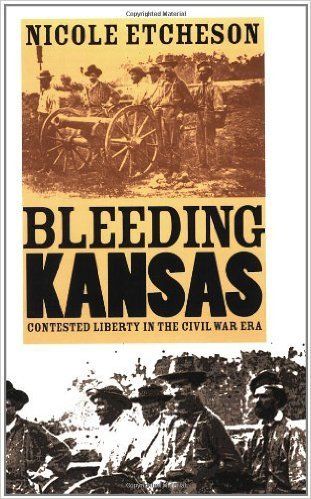
The excerpt I started off with come from chapter 4, “We Are But Slaves: The Free-State Movement.†Chapter 1 covers Douglas’s effort to get the Kansas-Nebraska Act through Congress. Chapter 2 is about the migration of both slavery proponents and free-soilers to the new territory after its passage. Chapter 3 covers the unbelievably flawed process used to elect the first territorial legislature. That was all-important since that body would vote on whether Nebraska was to be a slave or free state.
I have found “Bleeding Kansas†to be quite readable for a non-scholar like me; well organized, plenty detailed, and straightforward in style. The time period covered is 1854 to 1864, so it should provide background for almost the whole period of this forum.
The other book I have started is a biography by David Herbert Donald called simply “Lincoln.†I picked that one from the vast selection of such works base on reading a few reviews at Amazon.
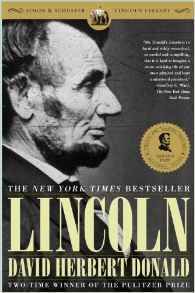
I hope to acquire more Lincoln bios over the course of the next few years but I wanted to start with a well-regarded, single volume book. I have only gotten to 1856 in the chronology but have enjoyed the book so far. It starts with descriptions of some of Abraham’s ancestors in Virginia and moves to the primitive frontier boyhood I remember from long-ago. His early days in New Salem, Illinois are covered, as he decided what to do with his life. He won a seat in the Illinois state legislature in 1834 and studied to be a lawyer. He balanced his political activities with the law. He was junior partner in two different firms before becoming senior partner when he joined with William “Billy†Herndon. That association continued until Lincoln went to Washington. By 1855 the firm was thriving, with railroad cases the most lucrative. In 1842 Lincoln married Mary Todd and they started a family in Springfield. After two terms in the Illinois legislature he was elected to the U.S. House of Representatives as a Whig. He had to master the Illinois political game to accomplish that. He attempted to work that system to be selected as U.S. Senator from Illinois in January 1855. But that was a longshot proposition and he lost out to Lyman Trumbull. The book explained some about the Whig party and also the Know Nothings. I always wondered about that name and now know it stems from the fact that membership was supposed to be secret. So if an outsider asked what they were up to the member supposedly replied, “I know nothing.†Why a political party should remain a secret I didn’t figure out. Initially the Republican party had an abolitionist tilt, which was considered radical – even in the north. So mainstream politicians – including Lincoln – steered clear of it. By 1854, however, with the future of the Whigs looking grim, Republicans were ready to organize as a free-soil alternative to the Democrats. Lincoln enthusiastically jumped in to advise the non-lawyers in that pursuit.
Lincoln was out of office in 1854 during the Kansas-Nebraska Act debate. I was interested to learn that he shadowed Sen. Stephen A. Douglas (D-Il) as that man traveled the state promoting his measure. Douglas gave a speech in Springfield on October 3 and Lincoln spoke in rebuttal the following day. They repeated the exercise October 16 in Peoria. They didn’t appear together on the same stage but those events seem a notable preview to the celebrated Lincoln-Douglas debates four years later.
That covers the highlights, I think. I recommend both these books and hope to read other recommendations of books covering the pre-Civil War period.
The Civil War is a very interesting topic and I'm sure here it will stimulate some interesting debate. When I teach my classes I rotate through questions about the Civil War for my students to discuss and debate and I always find the interactions fascinating as you will always have someone that will bring up a perspective that that most others have not thought of before.
Just for those who are interested, here is some background leading up to Bleeding Kansas that while not extremely detailed, does help set the stage for this topic at the survey level.
The issue of slavery in the colonies can be traced back to Jamestown. In 1619 a Dutch ship carrying slaves taking landed at the settlement to barter for supplies. When the ship departed, they left behind 20 African slaves. Some accounts state that this was in payment for the supplies taken, while others cite John Rolfe having confiscated them from the Dutch ship.
This left the settlers at Jamestown with quite a dilemma. At the time there were no laws or even rules concerning slavery in Virginia and in fact the first slave codes were still 40 years away. What should they do with these 20 African captives?
What they did have in Virginia was indentured servitude. In fact, the oldest known surviving servitude contract comes from that same year, 1619, when Robert Coopy of Gloucestershire, signed a contract agreeing to serve for 3 years from the day he landed in Virginia in return for save passage and the grant of 30 acres of land from his master at the end of the service.
So what became of these first 20 slaves? They became indentured servants. They would serve out their own servitude contracts and then go on to own land of their own. Some accounts even report that a few of them were successful enough to own indentured servants of their own.
As the colonies would progress, African slavery would become part of the make up of the English colonies. Massachusetts would become the first colony to legalize slavery in 1641 followed by Connecticut in 1650. By 1661 Virginia would also legalize the practice of slavery as indentured servitude had died out.
The practice of slavery would begin to die out though inside the next 100 years. It would begin in the north. The economy of the north, especially the agricultural economy did not lend itself well to slavery. Most farming in the north was either sustenance or market farming. When you are farming just enough to live on, you don't necessarily want another mouth to feed added to the mix and market farming is often small scale designed to be sold locally.
In the south it was another matter. Beginning with John Rolfe, tobacco began to form the basis of the southern economy. This would flow into other crops as the south grew. Indigo, sugar, rice, and eventually cotton would all become the economic backbone of the southern colonies/states. These are all commercial agriculture crops and they are all labor intensive crops. Both of these condition lent itself toward slavery as a form of labor to work this commercial interest.
In the north slavery would die out and even begin to be outlawed. Vermont would ban slavery first in 1777. Pennsylvania Quakers got the institution banned in 1780. Other northern states would follow with New Jersey passing a law for an eventual end of slavery in 1804. By the beginning of the Civil War that law still left 18 slaves living in the state.
It really looked like slavery would die out in the south as well. Globally the trend was working itself away from slavery. Even eventual ardent supporter of the "peculiar institution", John C. Calhoun, would say that slavery "like scaffolding of a building, [would] be dismantled after it had served its purpose." That would change in 1793 when Eli Whitney would invent the Cotton Gin. Whereas before the seeds from cotton had to be hand picked out which limited the production and size of cotton fields, his new invention in its original form could process 50 lbs of cotton a day. And that's just the hand cranked prototype.
Suddenly cotton became king in the south, and with it the need for labor to work the ever growing cotton plantations. Slavery went from a dying practice everywhere, to a necessary evil in the American South.
By 1820 this had become a major political issue. Which leads to the introduction of the Missouri Compromise of that year. Missouri had applied for statehood in 1818, but it was being resisted back in Washington by the northern free states. Why? Because in Congress, and especially in the Senate, slavery had become important enough that the balance of power in the Senate was of utmost importance. If Missouri was allowed to join the union as a slave state like they had applied, then it would shift the balance of power in the Senate toward the slave holding states (13 slave states, 12 free states).
The compromise, championed by Henry Clay (I often refer to him as the Buffalo Bills of presidential candidates), would split Maine off from Massachusetts admitting it as a free state and allow for Missouri to come in as a slave state. The balance would be maintained. Additionally, the remaining territory from the original Louisiana Purchase south of the 36°30’ parallel would be open to slavery and the territory north of that line (except Missouri) would be slave free.
The first half of the 19th century would see a deepening divide between the northern and southern states. One issue concerned tariffs. In 1828, Congress would pass a new tariff on imported goods that along with items like glass, and slate, included manufactured textiles. This would have a profound effect on the South. The southern economy was completely based on cotton. However, there was not much in the way of a textile industry for that cotton produced. The southern economy depended on the exportation of cotton.
Tariffs hurt this exportation business overseas and instead more cotton would be sent to the growing numbers of textile mills in the North. Manufactured goods produced in the north would then be sold back to the South, often at a price that was competitive with the rate of the imported (and taxed) goods. This caused a lot of animosity in the South especially around the importation of cheap, shoddy, fabric from Britain that was used to make clothing for slaves. Southern plantation owners felt that they were only exporting wealth, and mostly to the north at that.
This would lead to the idea of nullification and a test of the Constitution. Can a state nullify a federal law that is deemed destructive of the individual state? Vice President Calhoun decided to put the idea to the test on April 13, 1830 at a celebration of Thomas Jefferson's birthday. Calhoun was trying to judge the position of his President from Tennessee, Andrew Jackson. After multiple toasts that hinted to the rights of the individual states Andrew Jackson rose and gave a toast in which he stared down Calhoun and said, "Our Union, it must be preserved." Calhoun would respond to this with another toast, "The Union, next to our liberty, most dear. May we always remember that it can only be preserved by distributing equally the benefits and burdens of the Union." The die was cast between these two men, and Jackson's position could not have been clearer.
In July of 1832, Jackson signed the Tariff Act of 1832 which reduced the tariffs most harmful for the South, but it was not enough for Calhoun and his state of South Carolina. In November the state would pass the Ordinance of Nullification. This ordinance would challenge Federal authority by nullifying both of the aforementioned tariff acts.
This would lead to a showdown between South Carolina, and the Vice President, and President Jackson. Secession was a term on Carolinian's lips and they pondered the possibility of leaving the Union rather than let Federal authority rule the day. On December 10th Jackson would issue Proclamation #26 to South Carolina. In this proclamation he would refute the claim by South Carolina that they can annul Federal law or refuse to enforce it. He also would caution them to retrace their steps before this escalated into something even far greater.
In addressing secession he warns South Carolina that the Constitution is a compact, not a league and therefore states cannot depart from it at their leisure. He warn them that secession is treason and that it will be treated as such.
By the end of December, Calhoun would resign as Vice President and Congress would pass the Force Act which would authorize the use of military force against any state the refused the enforce the tariffs acts. Henry Clay would step into the fray again and broker a deal known as the Compromise Tariff of 1833 which would be at least acceptable to all and serve to end the crisis.
As the north and south became more polarized more issues would serve as points of conflicts between the two factions. During the administration of George Washington, a law was passed to protect slave owners rights to retrieve slaves that had fled into other states. The Fugitive Slave Act of 1793 allowed members from a state to enter another state to retrieve escaped slaves. The only burden of proof they were required to give was an oral or written affidavit of ownership and the alleged escapee was not permitted to defend themselves. Additionally, any who harbored an escaped slave was subject to fines as high as $500 dollars. Quite a sum for the day.
Northern states would begin to violate this act in the 1800s and the resistance would only increase as the years passed. In 1836, the Massachusetts Supreme Court would rule in favor of escaped slaves in Commonwealth v. Ames which would declare that any slave brought into the state was automatically free.
Southerners would claim that this violated not only the Fugitive Slave law, but also Article IV, Section 2 of the Constitution which states "No person held to Service or Labour in one State, under the Laws therof, escaping into another, shall, in consequence of any Law or Regulation therein, be discharged from such Service or Labour, but shall be delivered up on Claim of the Party to whom such Service of Labour may be due."
In 1842, Prigg v. Pennsylvania would find itself all the way to the Supreme Court where it would be ruled that Pennsylvania was within its rights to prohibit its own magistrates from enforcing fugitive slave laws since the execution of the fugitive slave clause in the Constitution was exclusively a federal power and therefore had to be enforced by federal agents.
To add more fuel to the issue, in 1848 the Mexican American War came to an end and with it was a wide stretch of new land conquered from Mexico. A new question would immediately be imposed. Would slavery be allowed in the newly acquired territory?
Enter Henry Clay again. In one of his last acts in his long political life, he would compose a compromise to answer this question and others that were causing division between the north and the south. It had so much stuff in it in fact that if was going to be impossible to get passed through Congress. Illinois Senator Stephen Douglas would take care of that by reworking this compromise into something that all side could agree to and hopefully put some of these issues to bed forever.
Included in the compromise was:
....California would be admitted into the Union as a free state.
....the slave trade will be abolished in Washington DC.
....a new tougher Fugitive Slave Act would be enacted
....and the territory acquired from Mexico with the exception of California would determine the existence of slavery based on Popular Sovereignty.
Though many felt this would put issues to rest, it would quickly show not to be so. The new fugitive slave law was by far the most divisive.
The new act allowed federal commissioners to issue warrants for the arrest of fugitive slaves and certificates for their return. The only evidence needed was an affidavit by the slave owner. The accused were denied the right to trail by jury and were not allow to submit any testimony in their defense.
That tracks close to the former act, but more was added.
If the commissioner determined that the accused was not an escaped slave he was paid 5 dollars for his work. If he determined that he was an escaped slave he was paid 10 dollars.
Anyone could be "deputized" to help capture accused escaped slaves (even abolitionists). If you refused to help, you would be fined $1000 and could be forced to pay the slave owner $1000 for each slave you failed to help retrieve, and could serve up to 6 months in prison.
This would immediately cause an outcry in the north by the growing abolitionist groups.
As for the other issue of popular sovereignty, after it was introduced in the Mexican secession, it was only a mater of time before the issue was raised again in those northern territories of the Louisiana Purchase. This would lead up to the passage of the Kansas-Nebraska Act in 1854, again championed by Stephen Douglas, which brings us up to date in our current story.



